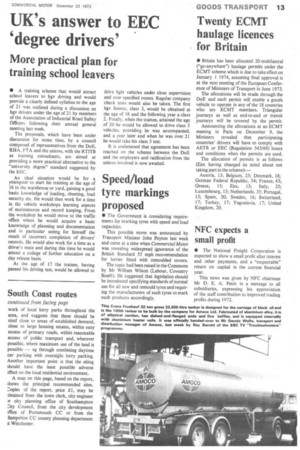UK's answer to EEC 'degree drivers'
Page 15

If you've noticed an error in this article please click here to report it so we can fix it.
More practical plan for training school leavers
• A training scheme that would attract school leavers to hgv driving and would provide a clearly defined syllabus to the age of 21 was outlined during a discussion on hgv drivers under the age of 21 by members of the Association of Industrial Road Safety Officers following their annual general meeting last week.
The proposals, which have been under discussion for some time, by a council composed of representatives from the DoE, RHA, ETA and the unions, with the RTITB as training consultants, are aimed at providing a more practical alternative to the "university degree" standard suggested by the EEC.
An ideal situation would be for a youngster to start his training at the age of 16 in the warehouse or yard, gaining a good basic knowledge of loading, sheeting, load security etc. He would then work for a time in the vehicle workshops learning aspects of maintenance and record keeping. From the workshop he would move to the traffic office where he would acquire a basic knowledge of planning and documentation and in particular seeing for himself the result of incorrect completion of drivers' records. He would also work for a time as a driver's mate and during this time he would attend a college of further education on a day release basis.
At the age of 17 the trainee, having passed his driving test, would be allowed to drive light vehicles under close supervision and over specified routes. Regular company check tests would also be taken. The first hgv licence. class 3, would be obtained at the age of 18 and the following year a class 2. Finally, when the trainee, attained the age of 20 he would be allowed to drive class 3 vehicles, providing he was accompanied, and a year later and when he was over 21 he would take his class 3 test.
It is understood that agreement has been reached on the scheme between the DoE and the employers and ratification from the unions involved is now awaited.
Speed/load tyre markings proposed
• The Government is considering requirements for marking tyres with speed and load capacities.
This possible move was announced by Transport Minister John Peyton last week and came at a time when Commercial Motor was revealing widespread ignorance of the British Standard 55 mph recommendation for lorries fitted with remoulded covers.
The topic had been raised in the Commons by Mr William Wilson (Labour, Coventry South). He suggested that legislation should be introduced specifying standards of normal use for all new and remould tyres and requiring the manufacturers of such tyres to mark such products accordingly.
Twenty ECMT haulage licences for Britain
• Britain has been allocated 20 multilateral ("go-anywhere") haulage permits under the ECMT scheme which is due to take effect on January 1 1974, assuming final approval is at the next meeting of the European Conference of Ministers of Transport in June 1973.
The allocations will be made through the DoE and each permit will enable a goods vehicle to operate in any of the 18 countries who are ECMT members. Triangular journeys as well as end-to-end or transit journeys will be covered by the permit.
Announcing the allocations at an ECMT meeting in Paris on December 8, the Ministers revealed that participating countries' drivers will have to comply with AETR or EEC (Regulation 543/69) hours and conditions when the permits are used.
The allocation of permits is as follows (Eire having changed its mind about not taking part in the scheme):—
Austria, 13; Belgium, 25; Denmark, 18; German Federal Republic, 54; France, 43; Greece, 15; Eire, 13; Italy, 25; Luxembourg, 13; Netherlands, 35; Portugal, 13; Spain, 20; Sweden, 16; Swizerland, 17; Turkey, 17; Yugoslavia, 17; United Kingdom. 20.
NFC expects a small profit
• The National Freight Corporation is expected to show a small profit after interest and other payments, and a "respectable" return on capital in the current financial year.
This news was given by NFC chairman Mr D. E. A. Pettit in a message to all subsidiaries, expressing his appreciation of the staff contribution to improved trading profits during 1972.












































































